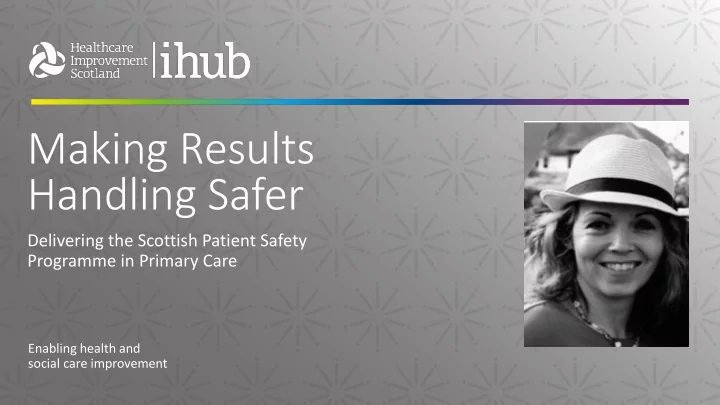

Making Results Handling Safer Delivering the Scottish Patient Safety Programme in Primary Care Enabling health and social care improvement
Back to 2015...
Inspiration…?
Quality Planning When your ark is sinking, you look for the elephants…
Identifying Your Priorities
Scope • Full Blood Count (FBC) • Urea and Electrolytes (U&E) • Liver Function Tests (LFT) • Thyroid Function Test (TFT) • On the day of the data collection each month randomly pick 20 patients who had one or more of the blood tests taken 3 weeks previously .
Care Bundle Making Results Handling Safer Bundle Elements • Are ALL the individual blood test(s) requested by the clinician clearly recorded? • Are ALL the individual blood test(s) taken clearly recorded? • Have ALL the results of the blood tests ordered been returned to the practice? • Were ALL the test(s) results forwarded to a practice clinician for review within 2 working days of being received by the practice? • Was a definitive decision recorded by a practice clinician on ALL test(s) results within 7 calendar days of being received by the practice? • Have the decisions for ALL test results been ‘ actioned ’ by the practice, including the patient being informed if required? (Where no actions are required record as Y)
Process Mapping
Discussion Points Systems Communication How does our practice ensure the results are Tracking How do clinicians record which blood tests are work-flowed, reviewed and acted on in a required? What is our practice’s tracking system for timely manner? reconciling samples sent with results returned Does our practice (including non-clinical staff) How does our practice ensure it actions and ensure appropriate clinical follow up? have agreed wording for communicating test emergency test results communicated by the results to patients? laboratory? Patient Experience Training How does our practice help patients understand the results handling system – and when and how to access their test results? How are staff, including locums, trained in the results handling system? How does our practice record that it has notified patients of their results and actions required?
Communication Unclear or ambiguous test result communication by doctors on reviewing results can lead to uncertainty about what action needs to take place and what should be communicated to patients. “ They don’t really give us enough information to pass it onto the patient.” It is suggested that all staff ensure they fully understand an agreed set of practice-wide terms, words and abbreviations related to the results handling process.
Examples of comments that REQUIRE action • Add/Change Medication • Contact patient and inform them • Make an appointment for bloods • Kidney function slightly abnormal – repeat in 1 week – phone patient • Make an appointment for fasting bloods • No action today – workflow to usual GP to advise • Repeat test(s) • Prescription required • Prescription issued • Inform Pharmacy • Tried to contact patient – failed please try again • Inform patient acceptable • Please repeat in xxxxx weeks • Repeat as per DMARDs protocol • Make URGENT in person / telephone appointment with DOCTOR
Examples of comments that DO NOT require action • Results are normal • Normal see task • Continue on current prescription • Inform patient when they phone in • Patient has been informed • Noted reduced kidney function – no action needs to be taken • Review already organised • Document has been seen – no action required • Results slightly out with normal range but acceptable and no further action is needed • GP has spoken to patient • Nurse has already spoken to patient
Year 2: 2016/17 Employment breakdown of attendees This is a really good topic PLIG group doing for patient safety that good work, helpful to will hopefully improve know we can bring patient care problems to them 6 41 99 GPs 16 GPOC talk very Practice Managers Practice Nurses useful & helpful, 37 Admin/Reception thank you Other title given Being new to 'GP land’ Another interesting from hospital, found session & looking this very informative forward to trying out and applicable to this new initiative myself
Support for practices
Care Bundle Making Results Handling Safer Bundle Elements • Are ALL the individual blood test(s) requested by the clinician clearly recorded? • Are ALL the individual blood test(s) taken clearly recorded? • Have ALL the results of the blood tests ordered been returned to the practice? • Were ALL the test(s) results forwarded to a practice clinician for review within 2 working days of being received by the practice? • Was a definitive decision recorded by a practice clinician on ALL test(s) results within 7 calendar days of being received by the practice? • Have the decisions for ALL test results been ‘ actioned ’ by the practice, including the patient being informed if required? (Where no actions are required record as Y)
Quality Improvement: some examples
Patient Experience
Bundle Data – all practices 2016/17 93% 98% 98% 96% 99% 98% 97% 98% 96% 97% 100% 91% 90% 82% 80% 70% 60% Percentage (%) 50% 40% 30% 20% 10% 0% Jul-16 Aug-16 Sep-16 Oct-16 Nov-16 Dec-16 Jan-17 Feb-17 Mar-17 Apr-17 May-17 Jun-17
Challenges Cumulative IT reporting Reconciliation High bundle Measure compliance
QI Capacity & Capability: the barriers
QI Capacity & Capability: the enablers
How We Work
Systems thinking: the legacy
Keep in touch w: www.ihub.scot/primary-care-portfolio/ e: hcis.pcpteam@nhs.net t: @SPSP_PC #PASC elouise.johnstone@nhslothian.scot.nhs.uk @PeeblesEllie Enabling health and social care improvement
Recommend
More recommend